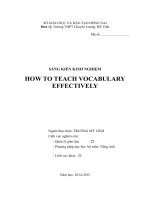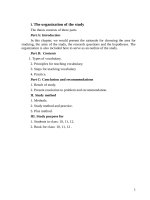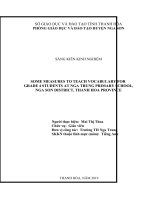game to teach vocabulary
Bạn đang xem bản rút gọn của tài liệu. Xem và tải ngay bản đầy đủ của tài liệu tại đây (1.27 MB, 50 trang )
Module:
Vocabulary
Facilitated By:
Cheryl Harvey
and
Rebecca Radicchi
Keys to Student Achievement:
Best Practices in Teaching
This session is based in the Vocabulary “Best
Practices” module designed by Metro RESA.
How confident do you feel about
your vocabulary instruction?
On a scale of 1 – 9, how confident are
you about your vocabulary instruction?
Place a post-it on the scale on the wall–
1 is the lowest & 9 is the highest.
1
95
Adapted from Dale, Rasband, Ross,
Gardner, & Cunningham, 2004
Essential Questions:
Why is vocabulary instruction so
important?
What are exemplary
strategies for vocabulary
instruction?
A little boy was in a relative’s wedding.
As he was walking down the aisle, he
would take two steps, stop, and turn to
the crowd. While facing the crowd, he
would put his hands up like claws and
roar. So it went, step, step, ROAR, step,
step, ROAR, all the way down the aisle.
As you can imagine, the crowd was near
tears from laughing so hard. The little boy
was getting more and more distressed
from all the laughing, and he was also
near tears. When asked what he was
doing, the child sniffed and said, “I was
being the Ring Bear!”
LEVEL 1 Unknown
LEVEL 2 Acquainted
LEVEL 3 Established
Beck, McKeown, & Omanson, 1987
What level of
vocabulary knowledge is
evident in this child’s response?
•
Discuss your
response with a
partner.
•
Group leader should
be prepared to share
with everyone.
How do you teach vocabulary?
Word knowledge is much more than word
identification or even definitional
knowledge–
“It takes more than definitional
knowledge to know a word, and we have
to know words in order to identify them
in multiple reading and listening contexts
and use them in our speaking and
writing.” (Allen, 1999)
There is an estimated
4,700 word difference in
vocabulary knowledge
between high- and low-
SES. (Nagy and Herman ,1984)
Research on the importance of
vocabulary instruction:
For English language
learners the “achievement
gap” is primarily a
vocabulary gap.
(Carlo, et.al., 2004)
Vocabulary instruction is
one of the essential
elements for literacy
development for students
“at risk.” ( RAND Reading Study
Group, 2002, NRP, 2000)
Word Knowledge is Multifaceted
Know it
well, can
explain it,
use it
Know
something
about it, can
relate it to a
situation
Have seen or
heard of the
word
Do not know
the word
schema
prosody
morpheme
schwa
automaticity
diphthong
dyslexia
Beck, McKeown, & Kucan, 2002
Comprehensive Vocabulary
Instruction
Rich language learning environment
( including Read-Alouds)
•
Wide and Varied
Independent Reading
•
Direct Vocabulary
Instruction
Reading Aloud
•
Students retain more vocabulary
when the teacher explains critical
vocabulary terms in context
during the reading.
•
Reading a book several times
leads to more word learning than
reading several books once each.
Reading Aloud
"The single most important
activity for building the
knowledge required for
eventual success in
reading is reading aloud
to children."
(Becoming a Nation of Readers, 1985)
Collaborative Pairs
•
What are the advantages of
reading aloud to students?
•
How do read-alouds support
vocabulary development?
Comprehensive Vocabulary
Instruction
•
Rich language learning environment
(including Read-Alouds)
Wide and Varied Independent
Reading
•
Direct Vocabulary Instruction
Reading Volume of 5th-grade Students of
Different Levels of Achievement
Achievement
Percentile
Minutes of
Reading Per
Day
Words
Per
Year
90
th
40.4 2,357,000
50
th
12.9 601,000
10
th
1.6 51,000
(Allington, 2001; Adapted from Anderson, Wilson and Fielding, 1988.)
Independent Reading:
Accounts for one-third or more of
vocabulary growth.
•
How do you show your
students that independent
reading is great & joyful?
•
How do you make
independent reading
time meaningful?
•
What obstacles do you
need to overcome?
Center for the Study of Reading, Urbana, IL
Comprehensive Vocabulary
Instruction
•
Rich language learning
environment
( including Read-
Alouds)
•
Wide and Varied
Independent Reading
Direct Vocabulary
Instruction
Vocabulary Instruction
Direct teaching of vocabulary can help improve comprehension when we follow
these guidelines (Cooper, 1993):
•
A few critical words are taught.
•
The words are taught in a meaningful
context. (including nonlinguistic
representations)
•
Students relate the new words to their
background knowledge.
•
Students are exposed to the words
multiple times.









